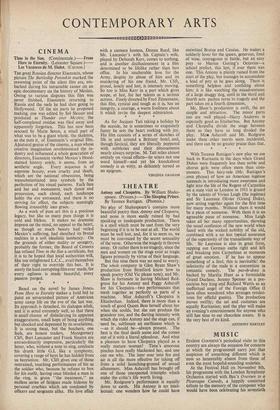THEATRE
Antony and Cleopatra. By William Shake- speare. (Princes.)—The Sleeping Prince. By Terence Rattigan. (Phoenix.) No play of Shakespeare's contains more beautiful poetry than Antony and Cleopatra, and none is more easily ruined by bad speaking or inadequate production. There is a spell which must be cast from the very beginning if it is to be cast at all. The world must be well lost, and, for it to seem so, we must be convinced by the secret sensuality of the verse. Otherwise the tragedy is thrown away. Or rather there is no tragedy, since the men and women on the stage exist as tragic figures primarily by virtue of their language.
But this time there was no need to worry. The whole company in Glen Byam Shaw's production from Stratford know how to speak poetry (Old Vic please note), and Mr. Shaw is fortunate in having Michael Red- grave for his Antony and Peggy Ashcroft for his Cleopatra—two performances that mesh together as perfectly as parts of a machine. Miss Ashcroft's Cleopatra is Elizabethan. Indeed, there is more than a touch of good Queen Bess herself about her when she scolds, but she can produce the grandeur too, and the darting intensity with which she rules Antony and the stage can, if • need be, sublimate an earthiness which is —as it should be—always present. The best is the final death scene and she comes out of it with a literal splendour. And what a pleasure to have Cleopatra played as a really mature woman! Time's amorous pinches have really blackened her, and one can see why. The later soar into fire and air is all the more effective for taking off from a solid • launching-ground of sexual allurement. Miss Ashcroft has brought off one of those unexpected triumphs which make the critic's life worth living.
Mr. Redgrave's performance is equally down to earth. His Antony is no intel- lectual: one wonders how he could have outwitted Brutus and Cassius. He makes a soldierly lover for the queen, generous, fond of wine, courageous in battle, but an easy prey to Marius Goring's Octavius—a school prefect, this last, if ever there was one. This Antony is plainly ruined from the start of the play, but manages to accumulate a load of pity as he goes along. There is something helpless and confiding about him: it is like watching the misadventures of a large shaggy dog, until in the third and fourth acts pathos turns to tragedy and the part takes on a fourth dimension.
Mr. Shaw's production is swift, the set simple and attractive. The minor parts too are well played—Harry Andrews is especially good as Enobarbus. But Antony and Cleopatra divide the stage between them as they have so long divided the play. Miss Ashcroft and Mr. Redgrave make these other merits seem incidental, and there can be no greater praise than that.
With Terence Rattigan's new play we are back in Ruritania in the days when Grand Dukes were frequently less than noble and chorus girls were often more than com- moners. This fairy-tale (Mr. Rattigan's own phrase) of how an American ingenue succeeds in introducing more sweetness and light into the life of the Regent of Carpathia on a state visit to London in 1911 is graced by the talents of Vivian Leigh (the ingenue) and Sir Laurence Olivier (Grancl Duke), now acting together again for the first time for many months. Without them it would be a piece of nonsense. With them it is an agreeable piece of nonsense. Miss Leigh takes all her many opportunities, showing the usual confusion of the new world when faced with the wicked nobility of the old, combined with a no less typical assurance of the superiority of the transatlantic way of life. Sir Laurence is also in great form, rapping out German oaths right and left and breaking into Carpathian at .moments of great emotion. If he has to appear something of a fool, this is inevitable: the inferiority of the male is a convention in romantic comedy. The pas-de-deux is backed by Martita Hunt as a formidable Grand Duchess, Jeremy Spenser as a pre- cocious boy king and Richard Wattis as an ineffectual angel of the Foreign Office (I have often wondered who arranges rendez- vous for officral guests). The production moves swiftly; the set and costumes are equally Ruritanian; and the play will make an evening's entertainment for anyone who still has time to eat chocolate cream. It is the very best of its kind.
ANTHONY HARTLEY
































 Previous page
Previous page